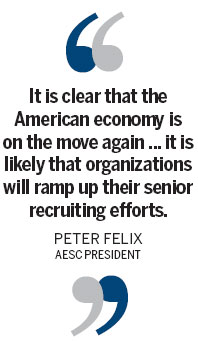Top jobs getting difficult to fill
Updated: 2013-09-20 15:36
By Michael Barris (China Daily)
|
|||||||||||
China will experience a severe managerial shortage in the world in the second half of 2013, continuing a five-year trend, according to a survey of executive search consultants.
That was the finding of 43 percent of the consultants in 15 geographical regions surveyed by the Association of Executive Search Consultants, an industry group.
Despite China's prosperity, people in the search industry see its economic growth as threatened by a dearth of professionals with Mandarin and English skills who are also familiar with the local and business culture and willing to relocate on short notice.
"There isn't enough talent that fits the bill locally and not enough international talent equipped with the knowledge to take on the local Chinese market," Joe Chappell, AESC global marketing director, says. The shortage "is not expected to wane any time soon."
AESC President Peter Felix says in a news release that it's "no surprise" to see executive talent shortages in China and other developing nations "already affecting these countries' ability to fulfill their growth aspirations".
Rick Dai, chief executive officer of the Beijing-based Wisest Consulting executive search firm, says that the management shortage in China "will become very serious in the coming year or so.
"Year by year, the gap is becoming bigger and bigger. The shortage will certainly not be satisfied in the next three to five years."
The Financial Times reported in April that business-education system on the Chinese mainland is unable to produce upper-management candidates fast enough to meet demand in the world's second-largest economy.

In the past, international companies offset local managerial shortages by bringing in Taiwan- and Hong Kong-born executives, hiring mainland-born graduates returning from international universities or sending out expatriates, the Financial Times reported, adding that these managers can lack an instinct for local markets.
Cash-strapped global companies are also starting to balk at the cost of sending out expatriates, the newspaper says.
For the report, released in late July, AESC analyzed 142 responses from AESC executive search consultants around the world.
Africa dislodged Brazil in the report as the second most likely region to experience a second-half executive-talent shortage, 34.2 percent to 21.9 percent. Next on the list was Latin America, at 19.3 percent, followed by Southeast Asia (18.4 percent), India (18.4 percent), and the United States (16.7 percent).
The sectors expected to experience the greatest demand for senior executive talent in the second half of the year are healthcare/life sciences, energy/natural resources and manufacturing, according to the report.
Search consultants in the Americas have the most positive outlook for the search industry going into the second half of this year, the report says.
Felix says that optimism among AESC member companies is at a two-year high and indicates "an upward trend".
He adds: "It is clear that the American economy is on the move again, and with more encouraging indicators from parts of Europe and the developing world, it is likely that organizations will ramp up their senior recruiting efforts."
michaelbarris@chinadailyusa.com
(China Daily European Weekly 09/20/2013 page15)
Today's Top News
Verdict of Bo Xilai: Life in prison
Russian embassy to Syria shelled
Gunmen holding hostages in Nairobi
Amber alert across Asia, but not red
China signs 12 deals with Venezuela
Bo Xilai gets life in prison
New Sino-US ties sought
One Chinese killed in Nairobi attack
Hot Topics
Lunar probe , China growth forecasts, Emission rules get tougher, China seen through 'colored lens', International board,
Editor's Picks

|

|

|

|

|

|





